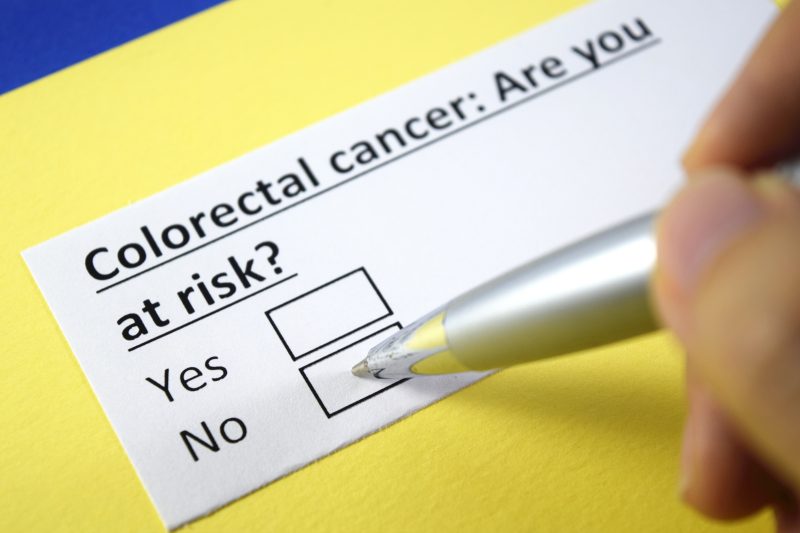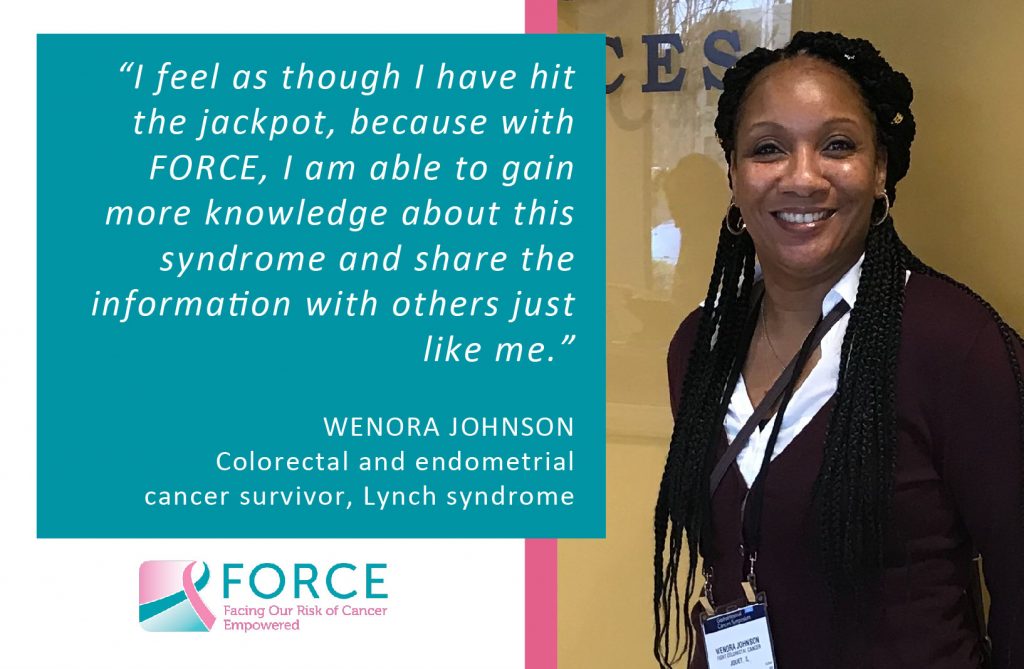PUBLISHED: 4th March 2020

After five years with no evidence of disease (NED), Wenora Johnson’s colon cancer returned and her oncologist recommended genetic testing. She tested positive for Lynch syndrome, an inherited syndrome associated with a genetic predisposition to different types of cancer.
Today, Wenora is a three-time cancer survivor, advocate and FORCE volunteer.
With Lynch syndrome Awareness Day on March 22, we asked her to share her story. It is one of positivity, hope and community support. We think you will be inspired as we are by her!
Here is what Wenora had to say:

One of my favorite quotes by author and pastor Charles Swindoll is, “Life is 10 percent what happens to you and 90 percent how you react to it.” These words kept me going after my diagnosis of stage IIIB colorectal cancer in 2011. I smile when I look back on that year, not because I battled this ugly thing called cancer, but because I drove my kids half-crazy with the inspirational quotes in giant letters that I posted throughout the house.
I was blindsided by my diagnosis. As a military reservist, my health had always been important to me. I exercised regularly, ate the right foods and received a clean bill of health every year from my doctor. The vast majority of people diagnosed with colorectal cancer are over 60, yet I was only 45 when doctors told me cancer had been growing inside me for almost 15 years.
I was determined to face the news with positivity. I underwent surgery and, after three months of chemotherapy, my troubles seemed to be over. The cancer was gone.
What I didn’t know was that I had Lynch syndrome.
Testing positive for Lynch syndrome
About 1 million people are estimated to have Lynch syndrome in the United States, but only around 5 percent are aware of their status. Caused by a hereditary genetic mutation, Lynch syndrome increases a person’s chances of developing more than a dozen types of cancer – especially colorectal and endometrial (uterine). Those affected often have a family history of cancer and run the risk of passing the mutation on to their children. They also tend to get cancer at an earlier age than the general population.
Other than my mother passing away from brain cancer, I had no warning signs that Lynch syndrome ran in my family in 2011. However, shortly after my own battle with cancer, my brother was also diagnosed with colorectal cancer. Then my aunt revealed that my grandfather had died from colorectal cancer at age 38. In light of this new information, my oncologist recommended that I undergo genetic testing in 2016.
I had been cancer-free for almost five years when I learned about my gene mutation. The more I researched Lynch syndrome, which is linked to a 60-80% chance of developing endometrial cancer, the more I knew that I couldn’t sit idly by and wait for illness to strike again. Healthcare professionals generally recommend that patients with Lynch syndrome have their ovaries and uterus removed by age 35, and I was already 15 years past that deadline.
Cancer resurfaces again
In 2016 I made the decision to have a total hysterectomy, and it wasn’t a moment too soon. When the surgeons biopsied my uterus, they found that I already had stage I endometrial cancer. Fortunately, I didn’t need further treatment because the cancer was removed before it had the opportunity to spread.
Since then, I’ve also been diagnosed with skin cancer on my back. As a person of color, I never would have suspected that what looked like a tiny pimple could be hiding a two-inch tumor beneath my skin. But knowing I have Lynch syndrome gives me an advantage when it comes to prevention. In my world, no abnormality goes unnoticed.
For Lynch syndrome patients, it’s normal to always be looking over your shoulder, waiting for when the next cancer may show up. My life depends on me staying one step ahead of the next diagnosis, which is why I follow an intensive screening regimen to detect cancers early. I see my primary care physician, oncologist, dermatologist, gynecologist and dentist at least once every six months.
Advocating for others
My experience has inspired me to work with multiple groups to advance cancer research and advocate for patients. This month, I hope to be a spark that ignites others to get tested. March is especially poignant for me. Not only is it Colorectal Cancer Awareness Month but the 22nd is also Lynch Syndrome Awareness Day.
FORCE has proven extremely valuable in my journey. The organization’s annual conference provides a rare opportunity to come together with hundreds of cancer survivors and previvors who are facing the same genetic challenges.
If members of your family have had colorectal or uterine cancer, please talk with your doctor or a genetic counselor about testing for Lynch syndrome. By arming yourself with knowledge, you can take power over your health, whether that means catching cancer early or preventing it altogether. Remember that life is 10 percent what happens to you and 90 percent how you react to it.
POSTED IN: Genetic Testing
TAGS: Hereditary Cancer , Genetic Testing , Lynch Syndrome , Endometrial Cancer
7 Comments
March 11, 2020
Thank you for sharing this. I just received confirmation that my genetic test came back today positive for lynch. It was discovered by what seemed like a small bump on my shoulder that turned out to be sebaceous carcinoma. I am trying to stay focused on being thankful that it lead me to knowledge that will help me put in place safe protocols to prevent cancers. Thank you for sharing you positive outlook. It is encouraging.
Karen Joyce
Reply
March 8, 2020
I enjoyed reading your story. I am experiencing my six cancer but found out that I had the Lynch syndrome about 8 years ago. None of my five children have inherited, thank God.. in my life my mother died of colon cancer at 38, my brother brain cancer at 31 and my two sisters both have had three cancers. So far I'm working on the Guinness World Book of Records! Onward and upward!
Mary Powers
Reply
November 23, 2020
Hello, I am 49 and I know thru genetic testing that I have lynch syndrome msh-6 . I was getting blood work and they asked me if I wanted to do this genetic testing so I just agreed. I never knew about lynch and my mom who has had 3-4 cancers turns out has it as well. Now I am supposed to do yearly colonoscopies that destroy my good bacteria and my gut microbiome and leave me wide open for infection. The risk of small pockets diverticulitis from the probe and any removal of polyps can actually send cancer cells into the lumen of the colon as well as fuel other cancers lurking somewhere. I have to have full sedation as the last time I guess they had to abort the mission because I was not cooperating I guess (don’t remember a thing) and now yearly anesthesia. I think I may be doing more harm to my body than if I didn’t do the testing. How does one know if knowing is a good thing or a bad? There are risks associated with colonoscopies and anesthesia that I am just so fearful of. No one in my family had colon cancer. My mom maybe had all her cancers from it but her lifestyle isn’t anywhere near as good as mine. I wonder how often I should get a colonoscopy and if I should just look at it as a blessing I know and do the yearly testing. I feel like it did damage my bowel movements in a way I can’t describe. Like I have ibs from the prep and procedure. Not sure if anyone else feels like they maybe wished they didn’t know so you could just live without the worry and added risks of procedures? They aren’t even 100%. Did anyone else choose to do another form of routine checking ? Thanks
Jeff
Reply
August 8, 2020
I have two sons with Crohn’s disease and the youngest of our four sons was diagnosed with colon cancer at 28 years old. His large intestine was removed like mine. He tested positive. I have two sisters who are positive, along with another cousin who is positive and whose son had colon cancer at age 26. He is positive for lynch. Lynch is very strong in my family.
Mark Orozco
Reply
June 16, 2020
Hello Wenora, this article was very interesting to read. Very sorry that you have been impacted with Lynch disease. Glad you are on top of things. Praying for you!
Martha Seemann
Reply
August 8, 2020
I am a seven time cancer survivor. My mother, her only sibling and sister fought cancer that started in the colon for years that eveMutually took their lives. Their mother and mother’s sister both passed from colon cancer. My aunt who died of the colon cancer lost one of her sons at age 33 who had stage four colon cancer. In 2012, after a routine colonoscopy, my GI doctor found a large malignant tumor growing out of my appendix and into my large intestine. I was the first one in my family to be tested for lynch and am positive. My entire large intestine was removed. Up to that point, I had approx. 80 pre-cancer polyps removed over a 20 year span. Also, another 40-50 pre cancer cysts and skin cancers removed from my face, chest, arms, stomach and back. I have had throat cancer as well, all together, more surgeries and radiation than I can count. I am 63 now and glad for everyday I am still alive
Mark Orozco
Reply
April 22, 2020
[…] Learning I Had Lynch Syndrome Helped Save My Life […]
National Minority Cancer Awareness Month: Is the Cancer in Your Family Hereditary? - Facing Our Risk of Cancer Empowered - Facing Our Risk of Cancer Empowered
Reply